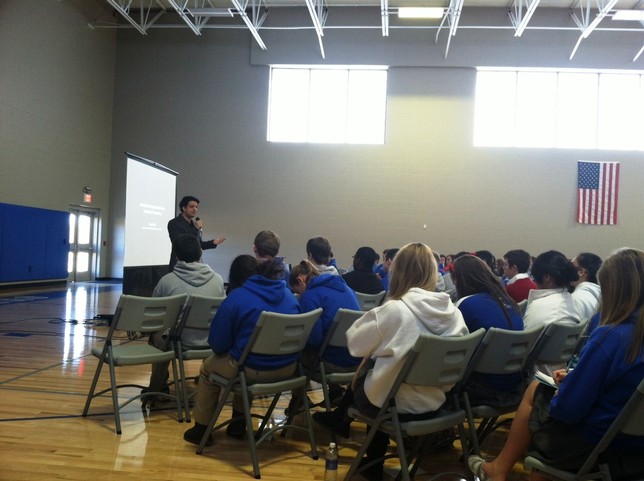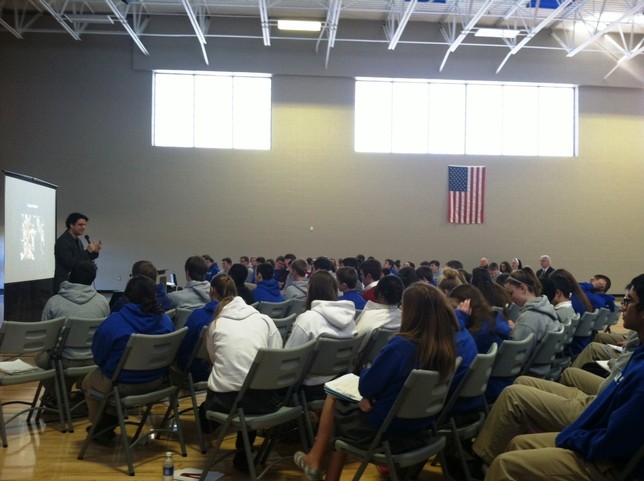January 27, 2014
On Friday January 24, 2014 Assistant Conductor Roger Kalia gave a lecture at Christ the King Catholic High School in Huntersville. He spoke on sacred music and the differences of performing works (like the Bach Passion) in a cathedral or church versus a performance hall. He also discussed how the pieces were performed historically against how they are performed today. For the second half of the talk he spoke on the role of a conductor, had students watch video clips of famous conductors and then compare/contrast their varying styles. The students even convinced Roger to show a YouTube clip of him conducting!
Students were asked to write a blog entry on their response to the talk. Logan Thayer, a student at Christ the King Catholic High School had this to say:
"I learned a lot about musical perspective from Maestro Kalia's presentation. As a student in a Catholic School, I often heard about sacred and secular music as two separate entities, which may or may not have opposed each other. In his presentation, Mr. Kalia linked these two by his explanation of his own work and the collective work of the Charlotte Symphony Orchestra. I learned of the presence of previously sacred music in secular music halls, which came as a bit of a surprise. As sacred music had become more popular on a secular stage, many composers such as Bach and Mozart began to compose pieces intended for viewing by an audience rather than a church piece like Gregorian chant. Maestro Kalia then demonstrated the variety of techniques used by conductors to convert the individual talents of many diverse musicians into the creation of a beautiful production. He explained how conductors use different methods on stage, such as the use of hand movements, rhythm, and most importantly, trust. "A conductor must have the ultimate trust in his orchestra", he said. He described musical productions as the results of many months of work compacted into a show of a few hours. However, in those hours, the union of sacred and secular music remained strong."

Charlotte Symphony
Charlotte Symphony
Posted in Education & Community. Tagged as conductors, Education.
January 15, 2014
I have been participating in "Bridging Musical Worlds," celebrating the legacy and life of Dr. Martin Luther King, Jr. since January of 2009 (the date was the day before President Obama's first inauguration).
For the past six years A Sign of the Times of the Carolinas, a local jazz group, and musicians from the Charlotte Symphony (myself included) have presented a collaborative performance at The Historic Excelsior Club, the first African-American nightclub in Charlotte, to mark MLK Day.

Among the goals of this collaboration for the Charlotte Symphony is to expose audiences who may not necessarily have been to a Symphony concert to classical music in a setting other than the Blumenthal, and I applaud that. However, I feel that these concerts have served as outreach in both directions, helping symphonic musicians expand our horizons too.
An attitude trend among some classical musicians is that classical music is the apex of musical art; however, I have learned that this can be a rather tunnel-vision view.
The Excelsior experiences have been extremely beneficial to me because they take me out of my classical comfort zone. When the Symphony ensemble performs with A Sign of the Times, Tyrone Jefferson, the leader, encourages us to improvise; for most classical players, if you ask us to improvise a tune by ear, we freeze because there are not notes on a page! This is a skill which is second nature to jazz players...basically composing on the spot, which actually used to be an expected performance practice for classical musicians back in the 18th and early 19th centuries. To do this is both rather frightening and liberating, and I am grateful to the fact that Tyrone is very accepting and encouraging of our baby steps in that direction, no matter how tentative.
We are so fortunate to work with Tyrone, who served as the music director for the great James Brown. The things he learned about music (rhythmic feel, improv, etc.) from Mr. Brown he shares with his band, the young people who sit in on their rehearsals and with the Symphony players. Jazz has been called, on more than one occasion, "America's Classical Music." It is one thing for the Symphony to play arrangements of jazz works on a pops show, led by a classically trained conductor; it is a completely different level when one gets to play these pieces in a group which is steeped in that tradition and led by someone who thoroughly understands the style.
The performance venue and format of "Bridging Musical Worlds" at the Excelsior is quite different than a concert hall, but we Symphony musicians are given an extremely warm and gracious welcome by the audience and the jazz musicians. When we get into the jazz pieces, the classically trained musicians can be ducks out of water, but everyone from the band members to the people in the audience help us to swim.
There is a feeling of fellowship, mutual respect and goodwill that can be quite a rarity, and that has touched me deeply.
- Martha
Martha Geissler has been a violinist with the Charlotte Symphony since 1981. This year she is joined by fellow Charlotte Symphony musicians Jane Hart Brendle (violin), Joseph Meyer (Associate Concertmaster) and Matthew Lavin (extra/substitute cello).
At 7 p.m. on Sunday, January 19 at Charlotte's Historic Excelsior Club (921 Beatties Ford Road) A Sign of the Times of the Carolinas and the Charlotte Symphony present "Bridging Musical Worlds: Celebrating the Legacy of Dr. Martin Luther King, Jr." for the sixth consecutive year. The program is excited to welcome UNC Charlotte Department of Music as a new partner this year,
The event is FREE and open to the public. Doors open at 6:30 p.m.
Posted in Community, Education & Community. Tagged as Bridging Musical Worlds, community, CSO Musicians, Education, Musicians.
January 6, 2014
In recognition of unwavering dedication to the music and mission of the Charlotte Symphony, Frank Gentry is the recipient of the 2013 Sally Ann Hall Spirit of the Symphony Award. The award will be presented on Saturday, January 11 at Belk Theater in conjunction with the Orchestra's performance of Brahms Symphony No. 2.
"This award honors the unsung heroes of the Symphony who work diligently behind the scenes. Frank Gentry has seen the Symphony through thick and thin in his quiet and unassuming way for many years. We are thrilled to honor him," said Emily Smith, Chair of the Charlotte Symphony Board of Directors.
Like many dedicated members of the Charlotte Symphony family, Frank got his start with the Symphony as a listener, a music lover. Frank and his wife, Sarah Gentry, have been Classics patrons for many years, loyally supporting the Symphony from the seats of the audience, in addition to being generous donors. Frank served as a member of the Charlotte Symphony Board of Directors, devoting countless hours to the thankless work of committees, task forces and advisory groups. Behind the scenes, he helped the Symphony through trying financial times.
But, it is not only his passion for the music or the generous commitment of his time and money that makes Frank this year's winner of the Spirit of the Symphony Award. Frank stands out as an advocate, a champion, for the Symphony, who has rallied significant support for the Orchestra from others in the community when it was most needed.
"Frank's genius was his uncanny ability to bring people together to plan and develop out-of-the-box strategies that moved the causes he cared about forward, and he mentored others through the process," said Elizabeth McLaughlin, longtime Charlotte Symphony patron, former board chair and current board member who has worked with Frank over the years.
The Sally Ann Hall Spirit of the Symphony Award was created in 2007 to honor the memory of one of its most committed patrons, Sally Ann Hall. Devoted to classical music, Sally Ann Hall (1939-2005) was a member of the Charlotte Symphony Board of Directors and served as President of the Oratorio Singers of Charlotte Board. In 2004, she and her husband Joseph Kirkland Hall, III established the Sally Ann Hall Chair for the directorship of the Oratorio Singers, now held by Scott Allen Jarrett.
Like Sally and Frank, recipients of the annual award demonstrate a commitment to the Symphony as an organization, show a profound respect for its music and musicians and motivate and encourage others to become actively involved with the Symphony family. Winners are chosen from an open slate of nominations by a committee that represents the CSO Board, Staff, and Musicians and the Oratorio Singers of Charlotte. Past recipients include David Mills (2007), Dr. George Stegner (2008), Richard J. Osborne (2009), Patricia A. Rodgers (2010), Mark R. Bernstein (2011) and Deena Outwater Surphlis (2012).
A South Carolina native, Frank was born in Abbeville, SC in 1942, and grew up in Clemson, SC, graduating from Clemson University in 1964. He then went on to earn a prestigious Mellon Fellowship and a masters of science in industrial administration from Carnegie Mellon University. He landed in Charlotte with Bank of America, and retired as an executive vice president for Bank of America Corp. As a volunteer and philanthropist, Frank has served on boards of the Charlotte Symphony, Clemson University, International House and the John Crosland School among other engagements. In his retirement, he has become a Bridge Life Master and continues to attend Charlotte Symphony concerts. With his wife Sarah he has two sons, John and David, and two grandchildren.
Charlotte Symphony
Charlotte Symphony
Posted in Classics. Tagged as Classical, philanthropy.










